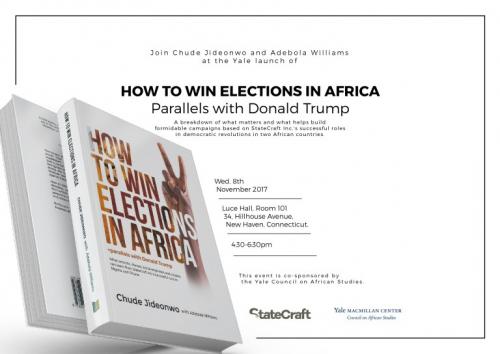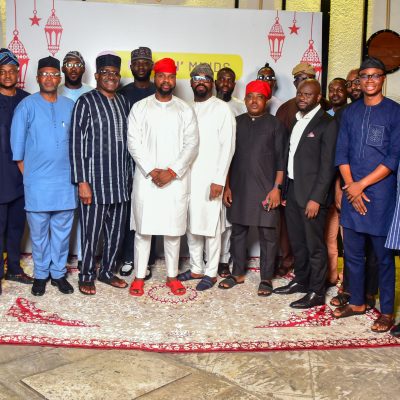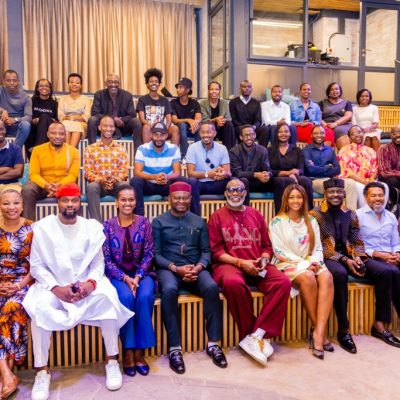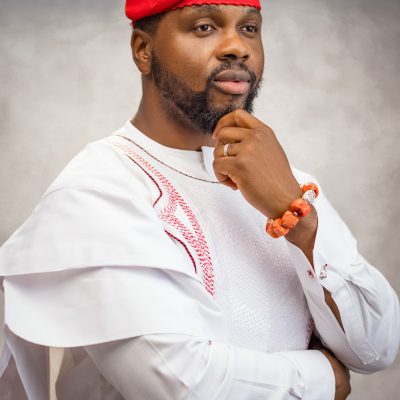
A member of my board and a major mentor was a fellow a couple of years ago and she has been deliberately leading me towards resources that helped me find what we both called my authentic self. She was definite that this was going to be a pivotal experience for me and encouraged me to apply. She was completely right. The fellowship came at the exact time that I most required it, at the precise point when I move from one assignment in my life to the other. I am grateful to Yale – and to her.
How did you first get involved in working on African elections and why?
It was completely unexpected. I was contacted out of the blues by a senior official in the presidency of my country in 2010. He wanted one of our organisations to create a road map for youth engagement in governance over a decade. We constituted a high level youth consultative group and delivered the document, and that concluded that, we thought. After that, our magazine Y! wanted an interview with the president. We made that request.
And then along the way, they say we hear you also run a youth communication agency. The president wanted to run for office (he had assumed office in his current tenure because the original president had died in office) and he would like that company, Red Media Africa to run the youth communication. This was almost surreal. To run youth engagement at the highest possible level. We had never even considered the possibilities. It had the element of every single thing that made us excited about the media and nation building. I will always be grateful for that opportunity.
Again, serendipity. In 2015, we were again contacted to run another presidential campaign. Everyone assumed the candidate would lose because he had run three times before. We assumed he would lose. But we thought this was a huge challenge. We were already disappointed with the president, and fed up with his political party which had been in office for 16 years. It was certainly time for historic change. And we thought, at worst you could shake up the ruling party from lethargy. We ran the entire communication for the campaign – TV, radio, print, outdoor, digital – across advertising, public relations 360 degree, and it was the most fun I have ever had in my life. I can’t speak enough of it. And the best possible outcome? We won!
We were invited to Ghana to repeat what they called the magic. We spent one year working with the then candidate – same circumstances: he had run twice and failed, the ruling party had been in for a while, no one though he would win. We ran the communication, working with the most energized team around the candidate – as always, a group effort – and the campaign won again. Against all odds! This was a really exciting time for an activist company that fully believed in political competition and anti establishment victories. I thought this had to be recorded somehow, the insights we had learnt from being at the forefront.
And at the same time, Trump happened. Many people saw an isolated global incident, but I saw definite threads between the revolutions in Nigeria, Ghana, Gambia et al, and then with Brexit and the American elections. I have been a supporter of Hillary Clinton from 2004 when I read her autobiography, and, as a young black man, I had supported her even against Obama. But while I loudly hoped and prayed for her victory, internally in emails to friends, I kept telling them she would lose. I could feel the anti establishment breeze, and it appeared American politicians weren’t taking it seriously enough. Citizens across the world were letting out a primal scream. And the establishment was refusing to listen.
So when November 8 happened I immediately began to write across national and international media platforms about the parallels, tracing the threads to the work we were doing in Africa. But it was when we were invited by the Odinga campaign to work in Kenya, and when my team sent in the preliminary report and it was the same anti-establishment fervor, I knew it was time to document this. We ended up working for the Odinga campaign for just a month, but the thesis was now abundantly clear. I felt a burden in my heart to tell this story, and to encourage a new generation of candidates to be less afraid of confronting establishments.
This was our “Yes We Can” book. So I worked with my cofounder and said I am going to do this, I have been writing this book in my head since November, and its crucial assignment is to draw parallels with the Donald Trump phenomenon. I went to sequester myself for two weeks, and by the time I was done, typing voraciously like a lunatic, I had come up with a 280 page book. I still can’t believe it till now! It was just pouring out! Sent it to my co founder who had been in forefront of Ghana and Kenya. He tweaked and added and panelbeated and we sent it around to people we respected. And here we are. Here we are.
Thank you for asking this. This is important to me. We have been working at the forefront of social movements for about 12 years now, and whilst elections are inevitable, my work on the frontlines has led me to expand my field of thinking about how nations really rebuild themselves.
My amateur research has recently centered on both the stability of nations like Norway and Denmark and at the same time the role of faith, joy and hope in the social movements that drove Nelson Mandela, MLK and Ghandi, a trifecta of legendary effectiveness if there ever was. I am already working on new publications that focus on the nexus of what these titanic leaders can teach a generation sometimes searching for quick fixes. After running all these elections – and we are also running at least two more actively at present – I know that elections are not enough.
The intersection of faith, social movements and youth is one of the crucial tripods of the new company I launch in January here in America, Joy, Inc. – and this company came together based off of my research here at Yale.
It focuses on translating and mainstreaming the research at the convergence of positive psychology, social movements and organizational behaviour, to help people, organisations, communities and nations flourish. If we are going to transform the lives of people and then our nations in meaningful ways, we have to learn from the globally available models that make it possible, we have to follow the evidence, we have to think bigger than the reactionary. And we have to do all of these without losing what researchers term the character virtues that enable you zoom out, to broaden and build; to maintain social, emotional and psychological equilibrium.
Social movements often flame out. Political movements often fold into self interest. We need something different – what some have called a politics of meaning, but this time centred on the evidence across the fields of sociology, divinity, politics, and even behavioural economics. That’s where I am focused on next.
I am excited about Joy, Inc. So excited. The work will have me criss crossing Sub Saharan Africa and America, largely because the research and the resources that facilitate the work are here, but the primary audience that drives my passion is on the continent. I am working with partners to gather the resources to map out the problems, possibilities and potentials across faith, psychology and social movements so we can have an evidenced approach to our work, and I am so excited to begin to deploy.
There is so much work to do. So much work to do. Yale has been a blessing. It has deepened, expanded and strengthens my vista and my resolve. The thinkers, doers and builders I have met through this programme across New Haven, DC, New York, Michigan, Pennsylvania, and everywhere else have me so excited. The world has come to a place where everything we assumed – the liberal consensus, capitalism and the wealth of nations, self interest and the cunning of reason, the rationality of markets and human behavior – everything has been turned upon its head. Those assumptions have led us to this depression epidemic across the world, a fundamental hopelessness and cynicism and the anti establishment rage that has taken over the youth.
We are at a time in our history when we have the impetus to rethink everything from Adam Smith to Alexis de Tocqueville. I tell people that the fact that Richard Thaler just won the Nobel Prize for Economics, a year after another behavioural economist, is a really big deal. It’s a really huge deal. We are at the cusp of fundamentally rethinking our assumptions about human behavior, and rethinking the metrics for measuring human success and flourishing. These are historic times we live in. People need to know this. People really need to know this in their souls. We need another interview for that. I am struggling to fit in all of that expansiveness into this one conversation!
Source: Yale University




